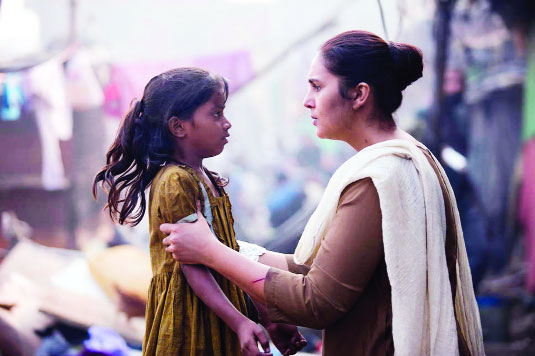Leila, Netflix’s latest offering, brings us face to face with a world where equality, justice, rule of law do not exist and segregation, lynchings and environmental hazards are the norm, says Saimi Sattar
Maybe it has to do with the zeitgeist of the times that we live in — dystopia is the term that is bandied about more often than utopia. Leila, Netflix’s new offering, is the second one after the Radhika Apte-starrer Ghoul to be described thus. This one, with Huma Qureshi in the lead, has the ability to deliver knockout punches which often makes the viewer feel almost breathless.
While the opening scene is idyllic, within moments it descends into chaos. A family of three, Shalini (Huma), Rizwan Chowdhury (Rahul Khanna) and their daughter, is frolicking in and around a private pool in their house but one can just feel an impending sense of doom that is likely to shatter this perfect picture. Within minutes, it spirals out of control and there seems to be no end to Shalini’s misery for the crime of having married a Muslim and giving birth to a child of mixed blood.
Based on a novel by Prayaag Akbar, of the same name, it depicts a future, which is grim and grey. The country is polluted, where clean water and fresh air are the luxuries that only the rich can afford. The segregation is not just confined to religions and wealth but that of castes where even in a van run by a jail, each category has been assigned a particular spot to sit in.
Set in 2047, in the country of Aryavarta, it is run by an authoritarian leader called Joshi and his close associate Rao, who is balding, plump and has a moustache. And this is despite putting out the claim, as is usual, that “it is a work of fiction and any resemblance to actual events and characters is entirely coincidental.” But then, the entire series is replete with references, for those looking for them, and hold up a mirror to incidents that have made it to the news pages rather than those centered around entertainment. At times, one feels that it is set in 2019 itself as there are contemporary reflections. A constant chant of “My lineage is my destiny. I am blessed to have been born in this land,” reminds one of the echo chambers that social media often replicates where hyper nationalism is the only form of patriotism that is acceptable. Questioning the state or its actions is obviously punishable. A telling scene, which takes place in the background of the main storyline is that of a mob demanding that Nakul Chaubey, the traitor should be hanged. Chaubey, by his appearance, is evidently a professor and the sidelining or even hounding of intellectuals is hinted upon. A person asks him, “You teach politics?” to which Chaubey replies, “I don’t teach, I educate.” When Chaubey says that they cannot seal his house and confiscate his books without a warrant, the chilling reply is, “We can do everything.” And while Shalini is dealing with her own issues in the foreground, Chaubey is thrown to a lynch mob wearing masks of Joshi. The reference of course is not lost. Neither is the one where children are made to watch a cartoon called Juniour Joshi which talks of the tales of valour of the founder of Aryavarta.
There is a vision of the Taj Mahal crumbling by what appears to be from a bomb planted inside to cries of ‘Hail Aryavarta’ which is broadcast live and celebrated. The reference to the Babri Masjid demolition in 1992 is but obvious and suggests that it can happen again given the uneasy relationship that the right wing has with the monument of love.
Environmental apocalypse that we keep dreading about is right here right now. There are water riots in the slums, something that we have witnessed during this summer in the country. Water, when it comes out of the tap is black sludge as is the rain when it falls. The sky is grey and dark even in during the day and naturally the worst affected are the ones living at the bottom of the pecking order.
Allusions to Nazi Germany too abound. Beginning with it being set in the land of Aryavarta, which of course, is a throwback to emphasis on the superiority of the Aryan race as espoused by Hitler. Then there is this emphasis on maintaining racial purity where there is a device to test whether a child is of mixed blood and thus, expendable. And if anyone had any doubts where Leila was drawing many of the details from, placing women in chambers and gassing them, nailed it.
While on the surface, it is a quest of a mother whose daughter has gone missing, just a layer underneath are the political allusions which are certainly not subtle. It is the first episode where the complete subjugation of women, to the extent where they are drugged into obedience, bathe in unclean water, forced to polish shoes or roll on leftover food as penance, which is gut wrenching. While the tone picks up from the second episode onwards, it is also maybe due to the fact, that you have got lulled into the misery that seems to abound in the pure land of Aryavarta. Huma, in her makeup less avatar, grabs the option to perform with both her hands. The weak link is Rahul Khanna, who has worked with Deepa Mehta, the director of the first two episodes, before. Siddharth as Bhanu, part-helper part-tormentor of Shalini delivers a layered performance but that is what the audience has come to expect of him. Then there are veterans like Akash Khurana, who plays the soft-at-heart, yet stern Rao and Arif Zakaria, who portrays the never-bending Guru Ma.
Certainly not for the faint-hearted.


























